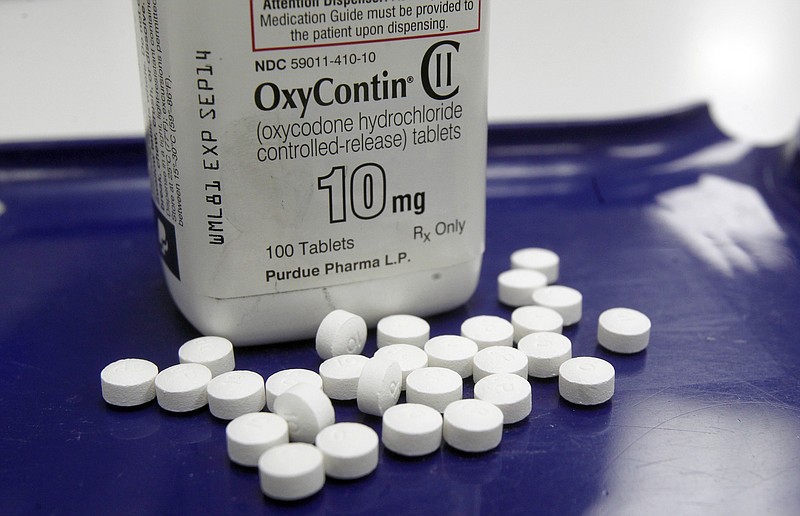President Donald Trump declared the opioid crisis a national emergency Thursday, a designation that would offer states and federal agencies more resources and power to combat the epidemic.
"The opioid crisis is an emergency. It's a national emergency," Trump said. "We're going to spend a lot of time, a lot of effort and a lot of money on the opioid crisis. It is a serious problem the likes of which we have never had."
Since 1999, the number of American opioid overdose deaths has quadrupled, according to the U.S. Centers for Disease Control and Prevention. Of the 500,000 people who died of drug overdoses, those who took opioids accounted for the majority.
What's more, new government data shows an increase in opioid overdose deaths during the first three quarters of last year, an indication that efforts to curb the epidemic are not working.
Apparently that's because we've been focusing on lowering the number of prescriptions written for opioids - drugs such as OxyContin, Percocet and Vicodin - given to reduce pain. These are drugs often taken - at least at first - innocently, until the patients found themselves addicted. We've focused less on addiction treatment.
It's not often that a public health emergency is declared for something other than a natural disaster. The Department of Health and Human Services declared one in Puerto Rico over Zika cases and the 2009-10 flu season prompted one over widespread concern of a pandemic.
But in 2016, heroin and opioid abuse - particularly among white males - became a campaign issue.
On Friday, the day after Trump tried using the opioid abuse policy to change the subject from Russia and Korea, NPR reported that critics in Washington have begun to question the move: "Opioid abuse is a crisis, but is it an emergency? That's the question gripping Washington "
Now, if the White House follows through with the required paperwork for an emergency declaration, it could free up FEMA money, public health workers could be deployed, access to medications that counter addiction could be increased, limits on Medicaid could be lifted, Congress could appropriate money for more drug treatment and intervention and states could request extra aid. "Could" is the operative word.
We need to demand that real experts shape the policies that will govern these next steps.
Opioids don't come from marijuana fields or from meth brew houses. Opioids come from our doctors, drug stores and medicine cabinets.
Are we going to put the same "war-on-drugs" label on these suppliers that Attorney General Jeff Sessions wants to slap again on people charged with possession of marijuana? Are we going to focus on suppliers or on buyers? Are we going to treat the symptom or treat the problem?
Tennessee ranks No. 2 nationally in the share of opioid prescriptions per capita, and is near the top in overdose deaths, according to 2015 numbers. Heroin-related arrests across the state have also spiked, according to data from the Tennessee Bureau of Investigation. There were 491 heroin-related arrests in 2012, rising to 1,452 in 2015 and growing by 46 percent to 2,119 in 2016. And an independent survey by San Francisco-based Castlight Health (using insurance claims data from 2010 through the end of 2015) ranked Chattanooga 20th in opioid prescription abuse among the worst 25 cities in the U.S.
Tennessee Gov. Bill Haslam said last month that his administration will explore whether to restrict long-term prescriptions of opioids for many TennCare patients.
"We're not going to defeat this [the state's opioid crisis] on the supply side," Haslam said. "So we're going to have to beat it on the demand side."
Wait. Tennessee is No. 2 in the share of prescriptions per capita - prescriptions per capita - and Chattanooga is 20th in the nation for "opioid prescription" abuse. Prescriptions are the supply side, folks.
Put another way, doesn't this mean Tennessee doctors are the nation's second highest prescribers - and therefore suppliers - of opioids? Shouldn't we be looking harder at them? Yet Haslam said, "We're not going to defeat this on the supply side." And the place he will look first is on rolls of the state's insurance for the sickest and the poorest - our unemployed and underemployed residents.
This particular opioid targeting plan is convenient for Haslam and lawmakers: Doctors and pharmaceutical companies are arguably among the most powerful lobbies in Nashville. The folks on TennCare may have just as much or more pain than anybody, but they have zero lobbying and bargaining power.
We hope what Haslam - and the Trump administration - will do is use this opportunity to focus our emergency money on addiction treatment and on careful physician/pharmaceutical policing.
But why would we think that, since TrumpCare and the GOP health reform plans all called for cutting addiction treatment?
